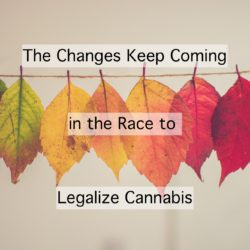This information is provided for educational purposes only. Reader retains full responsibility for the use of the information contained herein.
Since we last spoke, the cannabis legalization train has continued moving forward and will likely continue to do so for the foreseeable future. Over the past two months, three states legalized recreational cannabis, one state legalized medical cannabis, and one city created an ordinance pertaining to workplace cannabis testing. This article will feature a short overview of each change, as well as pertinent information for employers.
New York Legalizes Recreational Cannabis
In late March, Governor Cuomo signed the “Marihuana Regulation and Taxation Act” (the Act), legalizing cannabis for individuals 21 and older. The Act is immediately effective, although sales will not begin until at least 2022. Residents are permitted to grow plants at home and smoking cannabis is permitted wherever smoking tobacco is allowed.
Employers can continue to have policies that pertain to cannabis use in the workplace but cannot take adverse action against individuals based on their use of legal products and/or activities outside of work hours, off work premises, and in accordance with state laws.
Employers are permitted to take action against an individual if said action is required by state and/or federal law, if an employee is impaired by cannabis use (there must be specific, articulable symptoms observed that lessen an employee’s performance of work-related duties or interfere with the employer’s obligation to provide a safe and healthy workplace), or if not taking action would require the employer to commit an act that would cause them to be in violation of federal law or would result in loss of a federal contract or funding.
Virginia Legalizes Recreational Cannabis
In April, Governor Northam approved the sale and use of recreational cannabis in the state. While retail sales will not be available until 2024, recreational cannabis will be broadly legal as of July 1, 2021, when home grow of up to four plants and possession of up to one ounce of cannabis will be permitted.
As passed, Virginia’s law does not provide guidance for employers regarding cannabis use, drug testing, and workplace policies. It is likely that prior to full legalization and sales in 2024, the legislature will provide guidance for employers in the state, but that remains to be seen.
New Mexico Legalizes Recreational Cannabis
Governor Grishman legalized recreational cannabis for individuals 21 and older in early April via the “Cannabis Regulation Act” (the Act). Per the Regulation and Licensing Department, possession of legal cannabis is permitted as of June 29, 2021. The Act requires recreational sales to begin by April 1, 2022, with final license rules provided by January 1, 2022; however, sales may begin earlier if the legislature can provide final licensing rules prior to 2022.
The Act places no restrictions on an employer’s ability to take adverse employment action against employees based on their impairment by or possession of intoxicating substances (including cannabis) during work hours. Employers can adopt and implement a written zero-tolerance policy regarding cannabis products. Based on said policy, an employer may discipline or terminate an employee because of a positive drug test indicating delta-9-tetrahydrocannabinol or a metabolite thereof. Employers are not required to do anything that would require them to be non-compliant with federal law or regulations, or that would result in a loss of federal contract or funding.
Alabama Legalizes Medical Cannabis
Governor Ivey approved medical cannabis for Alabama residents in May 2021 via the Darren Wesley “Ato” Hall Compassion Act (the Act). The Act sets up a system to grow, process, test, transport, and sell products within the state. The Act includes 15 categories of conditions/symptoms for which an individual can be recommended medical cannabis and stipulates that it should not be used as a first treatment option.
Employers are not required to allow the use of medical cannabis or modify any job/working conditions of an employee who uses medical cannabis. Employers are not prohibited from taking adverse employment action against an individual because of the individual’s use of medical cannabis, regardless of that person’s impairment or lack of impairment. Employers are not limited in their ability to establish and enforce a drug testing policy, including one that prohibits the use of medical cannabis in the workplace.
Philadelphia Bans Pre-employment THC Testing
In April 2021, Mayor Kenney of Philadelphia signed Bill 200625 (the Ordinance) into effect, effectively prohibiting pre-employment marijuana testing within city limits. The Ordinance makes it an “unlawful employment practice” for employers to require applicants to submit to drug testing to determine the presence of marijuana as a condition of employment. Employers are required to comply as of January 1, 2022.
Individuals applying to work in the following positions/professions are not subject to the ordinance: police officers/law enforcement, Commercial Driver’s License (CDL) positions, childcare/supervision, medical care/supervision, disabled or vulnerable individual care/supervision, or positions where the employee could significantly impact the health or safety of other employees or the public (such positions will be determined by the enforcement agency set forth in the Ordinance).
If an employer is required to drug test by federal/state statute, is subject to a contract or grant of assistance with the federal government that requires drug testing, or is party to a collective bargaining agreement specifically addressing pre-employment drug testing, the Ordinance does not apply.



